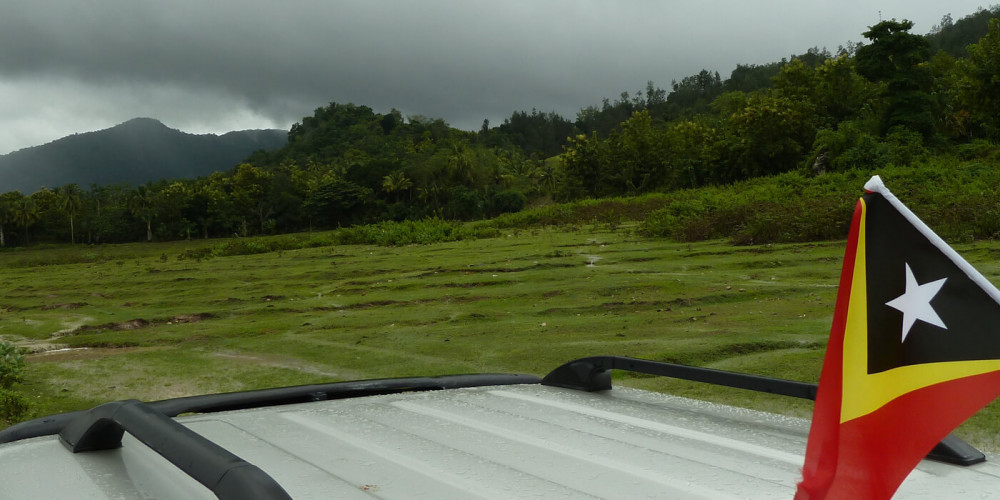KIT Blog
Stopping the spread of COVID-19 in Timor Leste
-
 The Leprosy Mission Australia
The Leprosy Mission Australia
- Oct 06, 2020
- Timor Leste
Dr. Teem-Wing Yip is an Australian doctor who’s been a supporter of the Leprosy Mission since she spent an elective with Heather and Trevor Smith in McKean Hospital and Rehabilitation Centre when she was a medical student. She’s been living and working in Dili, Timor-Leste, since last year, first at an Australian-funded NGO, and currently with an international organisation as a public health specialist supporting the government’s response to COVID-19.
Back in March, there was a lot of anxiety about COVID-19. On afternoon the first case was announced, I suddenly noticed that most people were wearing masks and everyone was washing hands before going into shops. Security guards outside shops wouldn’t let you in until you had washed your hands.
Soon the government declared a state of emergency and streets suddenly became amazingly quiet: schools were closed, public transport was stopped, many shops decided to close, the bishops cancelled all church gatherings, and those of us who were supporting the COVID-19 response were given special passes to go out.
Many of us worried how COVID-19 would pummel an already fragile health system. Many expatriates left in a hurry, especially when countries like Australia and New Zealand were encouraging all of their citizens to return home. Several of us expatriate doctors in our organisation decided to stay, because we figured that we didn’t have jobs to go back to and we could possibly be useful here. All commercial flights stopped, except for one weekly flight to and from Darwin. I certainly have no regrets about staying, and in fact, I ended up being unexpectedly recruited for my current job which has kept me very busy, but which I’ve loved.
Many people in the government have been working day and night to respond to the crisis. Many international government development aid agencies (including the Australians, the Americans and the Koreans which I have collaborated with in recent months), many non-governmental organisations, and United Nations agencies have also pitched in generously to support the government’s efforts.
To our pleasant surprise, six months on, we’ve only had a total of 28 COVID-19 cases confirmed in the country, and the health system is functioning as normal.
There is no doubt that the best decision that the government made was to ensure that everyone entering the country has to be quarantined for 2 weeks. Everyone is given a COVID-19 swab test before leaving quarantine, and almost all of the people who have been infected by the virus have been detected this way, and almost all were asymptomatic, and the others were only mildy affected.
At the beginning of the pandemic, all COVID-19 tests were sent to Australia for processing. But, thanks to a team of Australian doctors and laboratory scientists, working alongside Timorese staff, as well as the contributions of World Health Organization and the Australian government, reliable COVID-19 tests can now be run in Timor-Leste.
To date, over 8000 COVID-19 tests have been run, which it a great achievement, compared to zero capability at the beginning. But to put it into perspective, the Northern Territory, which has a population about 1/6 of that of Timor-Leste, has run over 49000 tests in the same period! So it is essential that we keep on testing, in order to detect any COVID-19 infections that might have snuck in.
We can’t be complacent — I get rather annoyed when I read articles that say that Timor-Leste has beaten COVID-19! We must continue to be vigilant by doing lots of tests, maintaining good infection prevention and control in healthcare facilities, and maintaining good respiratory hygiene in the community.
Meanwhile, life has normalised. Traffic is busy, shops are open, schools are open, churches gather as normal. However, the handwashing stations that popped up outside shops have either disappeared or have become disused. When riding crowded microlets, I’m often the only person wearing a mask. Few people wear masks in shops. When I send photos to my friends and family overseas, they are surprised that large groups are allowed to gather and no one is wearing a mask.
Clearly, people are reacting logically — there are no known cases of COVID-19 in the community, so there doesn’t appear to be the need to live life any differently. I can’t blame them.
But as a public health specialist, knowing the importance of handwashing, physical distancing, wearing masks, avoiding crowded and poorly-ventilated places (all of which the World Health Organization continues to enthusiastically promote in Timor-Leste), I worry how easily COVID-19 could spread. Of course, we also still worry how the health system would cope with more than a few patients who are very sick with COVID-19, when we know that highly-resourced health systems have had great trouble coping. So I really hope that everyone will quickly re-embrace these preventative measures whenever more cases are announced.
In the meantime, my colleagues and I continue to work hard to strengthen the health system with training, equipment and financial support so that people at risk of COVID-19 will be appropriately tested, those who are infected won’t transmit the virus to others, and those who end up unwell can receive appropriate treatment.
There is much to do! Please continue to pray for Timor-Leste!













